Note:
- This tutorial requires access to Oracle Cloud. To sign up for a free account, see Get started with Oracle Cloud Infrastructure Free Tier.
- It uses example values for Oracle Cloud Infrastructure credentials, tenancy, and compartments. When completing your lab, substitute these values with ones specific to your cloud environment.
Automate OCI Stack Monitoring deployment for OCI Compute Instances
Introduction
Stack Monitoring is one of the services offered for monitoring compute instances in Oracle Cloud Infrastructure (OCI) under the Observability and Management for the infrastructure deployed under the OCI tenancy. Stack Monitoring allows not only the storage of each disk, but also the filesystems created on each volume attached to the compute instances. Additional to storage, stack monitoring provides metrics for Availability, CPU, Memory, and Disk activity + Paging of the compute instances.
In our previous tutorial: Manage VM disk utilization using Stack Monitoring, we discussed monitoring storage filesystems of compute instances using OCI Stack Monitoring service where we manually enabled the Monitoring agent for each instance and then ran a discovery job for a single instance using a JSON file.
However, when it comes to a real production environment there are thousands of machines present and we can automate OCI Stack Monitoring deployment for OCI Compute Instances.
Objective
Automate the complete process of Stack Monitoring installation and deployment using custom scripts.
Prerequisites
- If you have already implemented the solution present in this tutorial then you can skip steps 2 to 5.
- The user should have the IAM permissions as mentioned in this tutorial.
- The Dynamic group for the management agents with the required policies must be created as mentioned in this tutorial.
- The User must have OCI CLI Version 3.16 or above installed on the machine where scripts will be deployed.
- The solution consists of shell scripts so needs to be hosted on a Linux/Unix shell compatible machine.
Task 1: Deploy the solution
Create a separate directory on your Linux based device to install the solution. Following are the detailed steps to deploy the solution in OCI:
-
Deploy the script for installing the Monitoring agent.
-
Create a new file named
agent-enable.shin the directory using the command:vi agent-enable.sh -
Copy the following code snippet and paste it in the agent-enable.sh file. Save the changes made in the file and exit.
#************************************************************************ # # Licensed under the Apache License, Version 2.0 (the “License”); # you may not use this file except in compliance with the License. # You may obtain a copy of the License at # # http://www.apache.org/licenses/LICENSE-2.0 # # Unless required by applicable law or agreed to in writing, software # distributed under the License is distributed on an “AS IS” BASIS, # WITHOUT WARRANTIES OR CONDITIONS OF ANY KIND, either express or implied. # See the License for the specific language governing permissions and # limitations under the License. # #************************************************************************ # Available at: https://github.com/dbarj/oci-scripts # Created on: Oct/2022 by Maninder Singh Flora and Akarsha Itigi # Version 2.0 #************************************************************************ #!/bin/bash DATE=$(date +'%m-%d-%Y-%T') Help() { # Display Help echo "This script will enable the Monitoring agent on the OCI Compute Instances by taking input of a Compartment-id or an Instance-id." echo echo "Syntax: sh <script-name> [-h|i|c]" echo "options:" echo "h Print this Help." echo "i Takes Instance-id as input and enables agent for that particular compute instance only." echo "c Takes Compartment-id as input and enables agent for all the compute instances in that compartment." echo } Allinstance() { LOG_FILE=$INPUT_ID-$DATE STR=$INPUT_ID MATCH1=$(echo $INPUT_ID | awk -F"." {'print $2'} | tr -d " ") MATCH2="compartment" INPUT_LENGTH=${#STR} LENGTH=83 if [ $MATCH1 = $MATCH2 ] && [ $INPUT_LENGTH = $LENGTH ] then touch /tmp/monitoring_agent/monitoring_agent_logs/agent_enable_logs/$LOG_FILE.log for INSTANCE_ID in $(oci compute instance list --compartment-id $INPUT_ID | grep ocid1.instance | awk -F":" {print'$2'} | awk -F"," {print'$1'} | tr -d "\"" | tr -d " "); do echo " " INSTANCE_NAME=$(oci compute instance get --instance-id "$INSTANCE_ID" | grep -i display-name | awk -F":" {print'$2'} | awk -F"," {print'$1'} | tr -d "\"" | tr -d " ") echo "$DATE Enabling Monitoring Agent for $INSTANCE_NAME ..." echo "$DATE Enabling Monitoring Agent for $INSTANCE_NAME ..." >> /tmp/monitoring_agent/monitoring_agent_logs/agent_enable_logs/$LOG_FILE.log oci compute instance update --instance-id "$INSTANCE_ID" --from-json file:///tmp/monitoring_agent/monitoring_agent_templates/agent_enable.json --force >> /tmp/monitoring_agent/monitoring_agent_logs/agent_enable_logs/$LOG_FILE.log echo "$DATE Enabled Monitoring Agent for $INSTANCE_NAME" >> /tmp/monitoring_agent/monitoring_agent_logs/agent_enable_logs/$LOG_FILE.log echo "$DATE Enabled Monitoring Agent for $INSTANCE_NAME" done else echo "[ERORR] : Invalid Compartment-id" fi } Instance() { LOG_FILE=$INPUT_ID-$DATE STR=$INPUT_ID MATCH1=$(echo $INPUT_ID | awk -F"." {'print $2'} | tr -d " ") MATCH2="instance" INPUT_LENGTH=${#STR} LENGTH=83 if [ $MATCH1 = $MATCH2 ] && [ $INPUT_LENGTH = $LENGTH ] then touch /tmp/monitoring_agent/monitoring_agent_logs/agent_enable_logs/$LOG_FILE.log echo " " INSTANCE_NAME=$(oci compute instance get --instance-id "$INPUT_ID" | grep -i display-name | awk -F":" {print'$2'} | awk -F"," {print'$1'} | tr -d "\"" | tr -d " ") echo "$DATE Enabling Monitoring Agent for $INSTANCE_NAME ..." echo "$DATE Enabling Monitoring Agent for $INSTANCE_NAME ..." >> /tmp/monitoring_agent/monitoring_agent_logs/agent_enable_logs/$LOG_FILE.log oci compute instance update --instance-id "$INPUT_ID" --from-json file:///tmp/monitoring_agent/monitoring_agent_templates/agent_enable.json --force >> /tmp/monitoring_agent/monitoring_agent_logs/agent_enable_logs/$LOG_FILE.log echo "$DATE Enabled Monitoring Agent for $INSTANCE_NAME" >> /tmp/monitoring_agent/monitoring_agent_logs/agent_enable_logs/$LOG_FILE.log echo "$DATE Enabled Monitoring Agent for $INSTANCE_NAME" else echo "[ERORR] : Invalid Instance-id" fi } # Get the options while getopts " hi:c: " option; do case $option in h) # display Help Help exit;; i) # Enter Instance-id INPUT_ID=$OPTARG Instance exit;; c) # Enter Compartment-id INPUT_ID=$OPTARG Allinstance exit;; \?) # Invalid option echo "[Error] : Invalid option" echo "Please check the valid options using ./<script-name> -h" exit;; esac done -
Give execute permission to the file using the following command:
chmod +x agent-enable.sh -
Create another file named
agent_enable.jsonin the same directory using the following command:vi agent_enable.json -
Copy the code snippet from below and paste it in the
agent_enable.jsonfile. Save the changes made in the file and exit.{ "agent-config": { "are-all-plugins-disabled": false, "is-management-disabled": false, "is-monitoring-disabled": false, "plugins-config": [ { "desired-state": "ENABLED", "name": "Management Agent" } ] } }
-
-
Deploy the script for running OCI Stack Monitoring Discovery Jobs.
-
Create a new file named
discovery-job.shin the directory using the command:vi discovery-job.sh -
Copy the following code snippet and paste it in the
discovery-job.shfile. Save the changes made in the file and exit.#************************************************************************ # # Licensed under the Apache License, Version 2.0 (the “License”); # you may not use this file except in compliance with the License. # You may obtain a copy of the License at # # http://www.apache.org/licenses/LICENSE-2.0 # # Unless required by applicable law or agreed to in writing, software # distributed under the License is distributed on an “AS IS” BASIS, # WITHOUT WARRANTIES OR CONDITIONS OF ANY KIND, either express or implied. # See the License for the specific language governing permissions and # limitations under the License. # #************************************************************************ # Available at: https://github.com/dbarj/oci-scripts # Created on: Oct/2022 by Maninder Singh Flora and Akarsha Itigi # Version 1 #************************************************************************ #!/bin/bash DATE=$(date +'%m-%d-%Y-%T') Help() { # Display Help echo "This script will run Stack-Monitoring Discovery-job on the OCI Compute Instances by taking input of a Compartment-id or an Instance-id." echo echo "Syntax: sh <script-name> [-h|i|c]" echo "options:" echo "h Print this Help." echo "i Takes Instance-id as input and enables agent for that particular compute instance only." echo "c Takes Compartment-id as input and enables agent for all the compute instances in that compartment." echo } Allinstance() { LOG_FILE=$INPUT_ID-$DATE STR=$INPUT_ID MATCH1=$(echo $INPUT_ID | awk -F"." {'print $2'} | tr -d " ") MATCH2="compartment" INPUT_LENGTH=${#STR} LENGTH=83 if [ $MATCH1 = $MATCH2 ] && [ $INPUT_LENGTH = $LENGTH ] then touch /tmp/monitoring_agent/monitoring_agent_logs/stack_monitoring_discovery_job_logs/$LOG_FILE.log for AGENT_ID in $(oci management-agent agent list --compartment-id $INPUT_ID | grep "CreatedBy" | awk -F":" {print'$2'} | awk -F"," {print'$1'} | tr -d "\"" | tr -d " "); do echo " " INSTANCE_ID=$(oci management-agent agent get --agent-id $AGENT_ID | grep -i ocid1.instance | awk -F":" {print'$2'} | awk -F"," {print'$1'} | tr -d "\"" | tr -d " ") INSTANCE_IP=$(oci compute instance list-vnics --instance-id $INSTANCE_ID | grep -i private-ip | awk -F":" {print'$2'} | awk -F"," {print'$1'} | tr -d "\"" | tr -d " " | head -n 1) INSTANCE_NAME=$(oci compute instance get --instance-id "$INSTANCE_ID" | grep -i display-name | awk -F":" {print'$2'} | awk -F"," {print'$1'} | tr -d "\"" | tr -d " ") cp /tmp/monitoring_agent/monitoring_agent_templates/discovery_job_template.json /tmp/monitoring_agent/monitoring_agent_templates/discovery_job_template1.json sed -i s/COMPARTMENT_ID/$INPUT_ID/ /tmp/monitoring_agent/monitoring_agent_templates/discovery_job_template1.json sed -i s/AGENT_ID/$AGENT_ID/ /tmp/monitoring_agent/monitoring_agent_templates/discovery_job_template1.json sed -i s/INSTANCE_IP/$INSTANCE_IP/ /tmp/monitoring_agent/monitoring_agent_templates/discovery_job_template1.json echo "$DATE Running Stack-Monitoring Discovery-job for $INSTANCE_NAME ($INSTANCE_IP)..." echo "$DATE Running Stack-Monitoring Discovery-job for $INSTANCE_NAME ($INSTANCE_IP)..." >> /tmp/monitoring_agent/monitoring_agent_logs/stack_monitoring_discovery_job_logs/$LOG_FILE.log oci stack-monitoring discovery-job create --compartment-id "$INPUT_ID" --from-json file:///tmp/monitoring_agent/monitoring_agent_templates/discovery_job_template1.json >> /tmp/monitoring_agent/monitoring_agent_logs/stack_monitoring_discovery_job_logs/$LOG_FILE.log echo "$DATE Stack-Monitoring Discovery-job created for $INSTANCE_NAME ($INSTANCE_IP)" >> /tmp/monitoring_agent/monitoring_agent_logs/stack_monitoring_discovery_job_logs/$LOG_FILE.log echo "$DATE Stack-Monitoring Discovery-job created for $INSTANCE_NAME ($INSTANCE_IP)" done else echo "[ERORR] : Invalid Compartment-id" fi } Instance() { LOG_FILE=$INPUT_ID-$DATE STR=$INPUT_ID MATCH1=$(echo $INPUT_ID | awk -F"." {'print $2'} | tr -d " ") MATCH2="instance" INPUT_LENGTH=${#STR} LENGTH=83 if [ $MATCH1 = $MATCH2 ] && [ $INPUT_LENGTH = $LENGTH ] then touch /tmp/monitoring_agent/monitoring_agent_logs/stack_monitoring_discovery_job_logs/$LOG_FILE.log echo " " INSTANCE_NAME=$(oci compute instance get --instance-id "$INPUT_ID" | grep -i display-name | awk -F":" {print'$2'} | awk -F"," {print'$1'} | tr -d "\"" | tr -d " ") INSTANCE_IP=$(oci compute instance list-vnics --instance-id $INPUT_ID | grep -i private-ip | awk -F":" {print'$2'} | awk -F"," {print'$1'} | tr -d "\"" | tr -d " " | head -n 1) COMPARTMENT_ID=$(oci compute instance get --instance-id "$INPUT_ID" | grep -i compartment | awk -F":" {print'$2'} | awk -F"," {print'$1'} | tr -d "\"" | tr -d " ") AGENT_ID=$(oci management-agent agent list --compartment-id $COMPARTMENT_ID --host-id $INPUT_ID | grep "CreatedBy" | awk -F":" {print'$2'} | awk -F"," {print'$1'} | tr -d "\"" | tr -d " ") cp /tmp/monitoring_agent/monitoring_agent_templates/discovery_job_template.json /tmp/monitoring_agent/monitoring_agent_templates/discovery_job_template1.json sed -i s/COMPARTMENT_ID/$COMPARTMENT_ID/ /tmp/monitoring_agent/monitoring_agent_templates/discovery_job_template1.json sed -i s/AGENT_ID/$AGENT_ID/ /tmp/monitoring_agent/monitoring_agent_templates/discovery_job_template1.json sed -i s/INSTANCE_IP/$INSTANCE_IP/ /tmp/monitoring_agent/monitoring_agent_templates/discovery_job_template1.json echo "$DATE Running Stack-Monitoring Discovery-job for $INSTANCE_NAME ($INSTANCE_IP)..." echo "$DATE Running Stack-Monitoring Discovery-job for $INSTANCE_NAME ($INSTANCE_IP)..." >> /tmp/monitoring_agent/monitoring_agent_logs/stack_monitoring_discovery_job_logs/$LOG_FILE.log oci stack-monitoring discovery-job create --compartment-id "$COMPARTMENT_ID" --from-json file:///tmp/monitoring_agent/monitoring_agent_templates/discovery_job_template1.json >> /tmp/monitoring_agent/monitoring_agent_logs/stack_monitoring_discovery_job_logs/$LOG_FILE.log echo "$DATE Stack-Monitoring Discovery-job created for $INSTANCE_NAME ($INSTANCE_IP)" >> /tmp/monitoring_agent/monitoring_agent_logs/stack_monitoring_discovery_job_logs/$LOG_FILE.log echo "$DATE Stack-Monitoring Discovery-job created for $INSTANCE_NAME ($INSTANCE_IP)" else echo "[ERORR] : Invalid Instance-id" fi } # Get the options while getopts " hi:c: " option; do case $option in h) # display Help Help exit;; i) # Enter Instance-id INPUT_ID=$OPTARG Instance exit;; c) # Enter Compartment-id INPUT_ID=$OPTARG Allinstance exit;; \?) # Invalid option echo "[Error] : Invalid option" echo "Please check the valid options using ./<script-name> -h" exit;; esac done -
Give execute permission to the file using the command.
chmod +x discovery-job.sh -
Create another file named
discovery_job_template.jsonin the same directory using the command.vi discovery_job_template.json -
Copy the code snippet from below and paste it in the
discovery_job_template.jsonfile. Save the changes made in the file and exit.{ "discoveryType": "ADD", "discoveryClient": "host-discovery", "compartmentId": "COMPARTMENT_ID", "discoveryDetails": { "agentId": "AGENT_ID", "resourceType": "HOST", "resourceName": "INSTANCE_IP", "properties": { "propertiesMap": {} } } } -
Create another file named discovery_job_template1.json in the same directory using the command.
vi discovery_job_template1.json -
Copy the following code snippet and paste it in the
discovery_job_template1.jsonfile. Save the changes made in the file and exit.{ "discoveryType": "ADD", "discoveryClient": "host-discovery", "compartmentId": "ocid1.compartment.oc1..aaaaaaaapi7c22bjp3zcuiywo2nabufke2lktkfhbf2ehqfclomnjc3vqh3q", "discoveryDetails": { "agentId": "ocid1.managementagent.oc1.iad.amaaaaaawe6j4fqa4f5q5pj3izevwffdpe63dvykmqzub2xakevch3a7xgtq", "resourceType": "HOST", "resourceName": "10.0.0.53", "properties": { "propertiesMap": {} } } }
-
-
Deploy installation script to complete the setup.
-
Create a new file named
installation.shin the directory using the command.vi installation.sh -
Copy the followin code snippet and paste it in the
installation.shfile. Save the changes made in the file and exit.#!/bin/bash mkdir Monitoring-Agent-Scripts mkdir /tmp/monitoring_agent mkdir /tmp/monitoring_agent/monitoring_agent_logs mkdir /tmp/monitoring_agent/monitoring_agent_templates mkdir /tmp/monitoring_agent/monitoring_agent_logs/agent_enable_logs/ mkdir /tmp/monitoring_agent/monitoring_agent_logs/stack_monitoring_discovery_job_logs cp agent_enable.json /tmp/monitoring_agent/monitoring_agent_templates/agent_enable.json cp discovery_job_template.json /tmp/monitoring_agent/monitoring_agent_templates/discovery_job_template.json cp discovery_job_template1.json /tmp/monitoring_agent/monitoring_agent_templates/discovery_job_template1.json cp discovery-job.sh Monitoring-Agent-Scripts/discovery-job.sh cp agent-enable.sh Monitoring-Agent-Scripts/agent-enable.sh chmod +x Monitoring-Agent-Scripts/discovery-job.sh chmod +x Monitoring-Agent-Scripts/agent-enable.sh rm -f agent_enable.json rm -f discovery_job_template.json rm -f discovery_job_template1.json rm -f discovery-job.sh rm -f agent-enable.sh rm -f installation.sh -
Give execute permission to the file using the command.
chmod +x agent-enable.sh
-
-
Complete the deployment. Now we have all the required files with all the necessary permissions.
-
To complete the setup run the below command in the same directory.
sh installation.sh -
This will copy the JSON templates to the right locations and create the log files to store the agent installation and stack monitoring job runs.
-
All the above-mentioned templates and JSON files will be copied on the location
/tmp/monitoring_agent/monitoring_agent_templatesand/tmp/monitoring_agent/monitoring_agent_logslocations respectively.
Note: You can see one directory named
Monitoring-Agent-Scriptsin the current directory. This directory has 2 scripts to install the agent and run the discovery job respectively. -
Task 2: Execute the solution
After the scripts have been deployed in your device, you can run the scripts to install the agents and run the discovery jobs for Stack Monitoring. Go to the Monitoring-Agent-Scripts directory and follow the further steps.
-
Run the Monitoring Agents in Compute Instances.
-
To install the Monitoring-Agent for a single Compute Instance you must run the following script with ‘-i’ option.
sh agent-enable.sh -i <oci_compute_instance_ocid> -
To install the Monitoring Agent in all the Compute Instances in a compartment you must run the script with ‘-c’ option.
sh agent-enable.sh -c <compartment_ocid> -
You can check the syntax and the option details using the ‘-h’ option with the script as follows.
sh agent-enable.sh -h -
Once the above script (1) or (2) has run successfully for the compute instance, you can check the status of the same in the compute instance’s details page under the Oracle Cloud Agent tab.
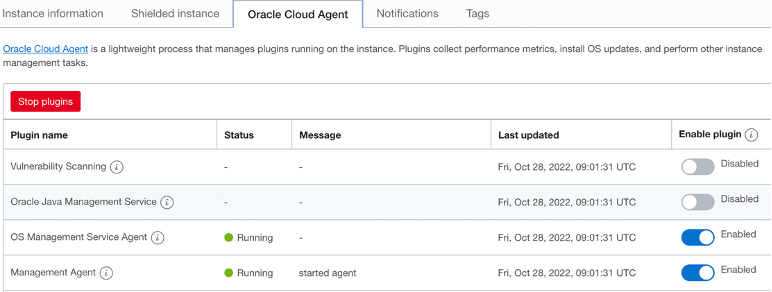
Note: Once the Management Agent displays in running state, only then proceed to further steps because if the Management agent is not running in the instance, then you will get errors in the further steps.
-
-
Run the OCI Stack Monitoring Discovery Jobs.
-
Once the Management Agent is running for the Compute Instance, you can run the following script with the ‘-i’ option to run the OCI Stack Monitoring Discovery Job.
sh discovery-job.sh -i <oci_compute_instance_ocid> -
To run the OCI Stack Monitoring Discovery Job for all the Compute Instances in a given compartment, you must run the script with the ‘-c’ option.
sh discovery-job.sh -c <compartment_ocid> -
You can check the syntax and the above option details using the ‘-h’ option with the script as follows.
sh discovery-job.sh -h -
The above script (1) or (2) may take up to 5-10 min to complete. Log in to the OCI portal, navigate to the Home menu, Observability and Management, Stack Monitoring. You can see the Stack Monitoring enabled and a complete dashboard on the Stack Monitoring page. After promotion, the resource type of the compute instance is a Host.
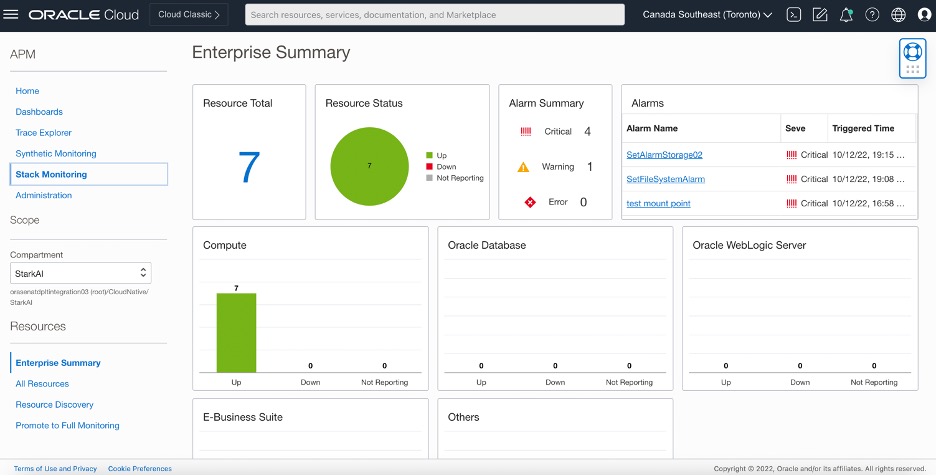
-
Check the status of the Promotion Job under Resource Discovery to verify the success of discovering the resources.
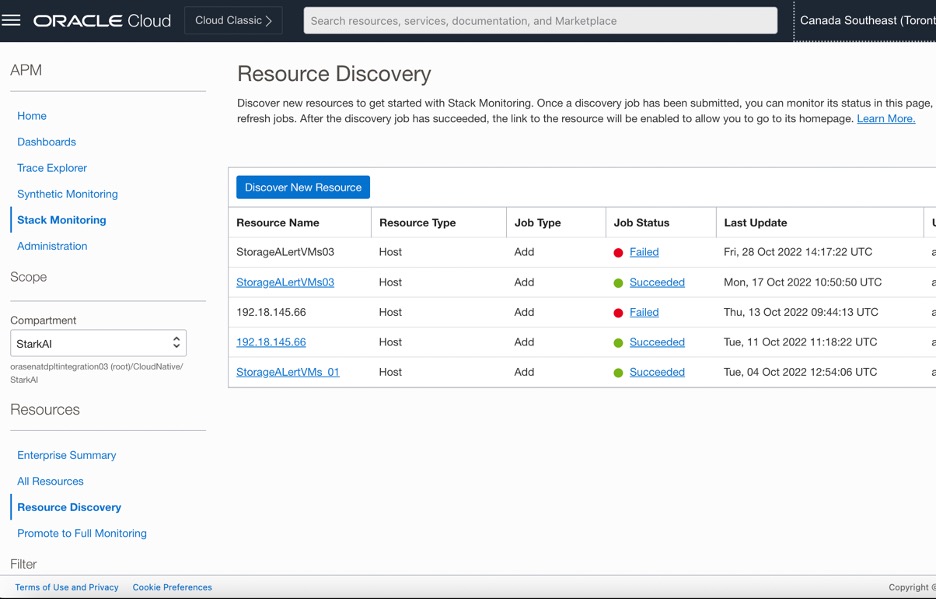
-
On the Stack Monitoring Dashboard, select the Resource block and you will be presented with a list of compute instances and hosts which you enabled the monitoring for.
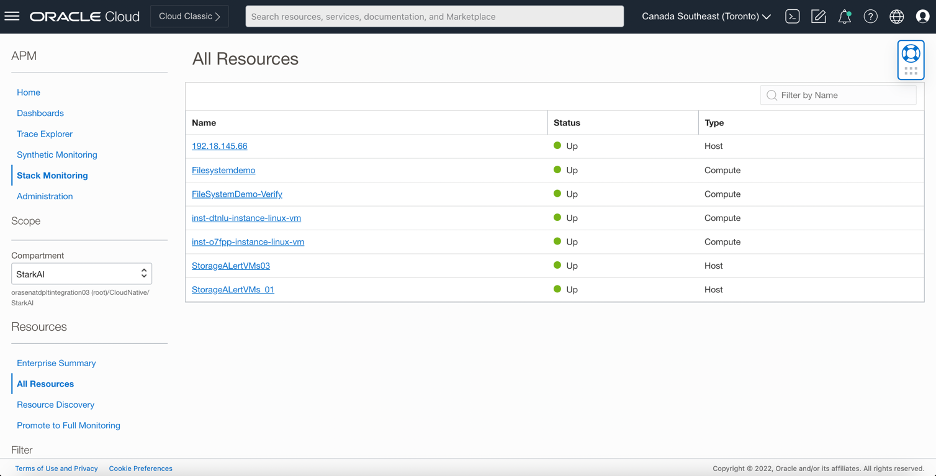
-
Select the desired host from the list and you will be presented with the detailed view of the metrics and tables displayed for that particular host.
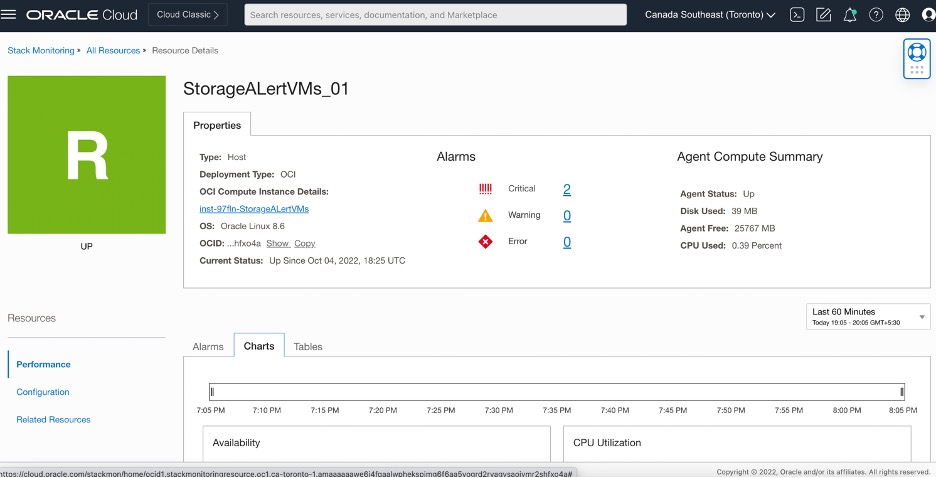
-
Host information and metrics are displayed as charts and tables on the Resource Details page.
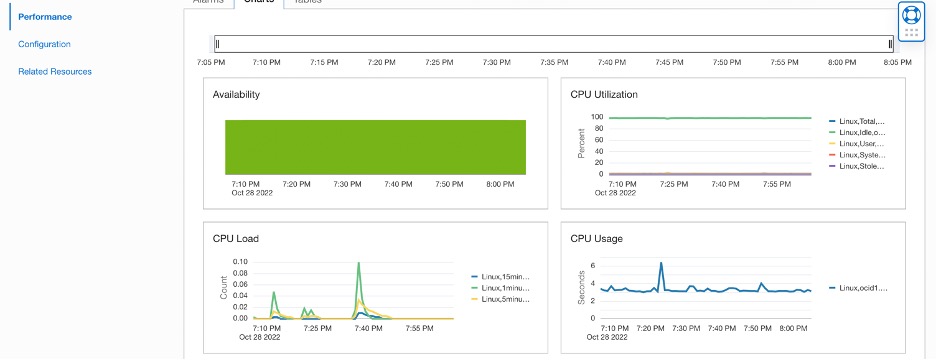
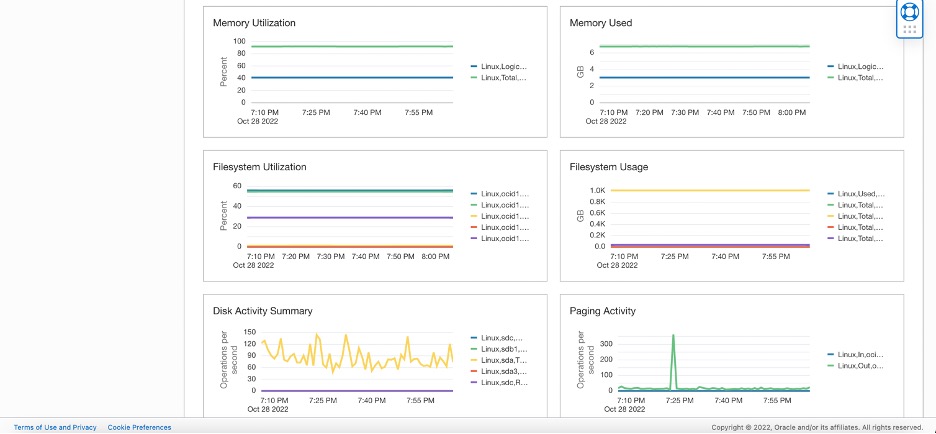
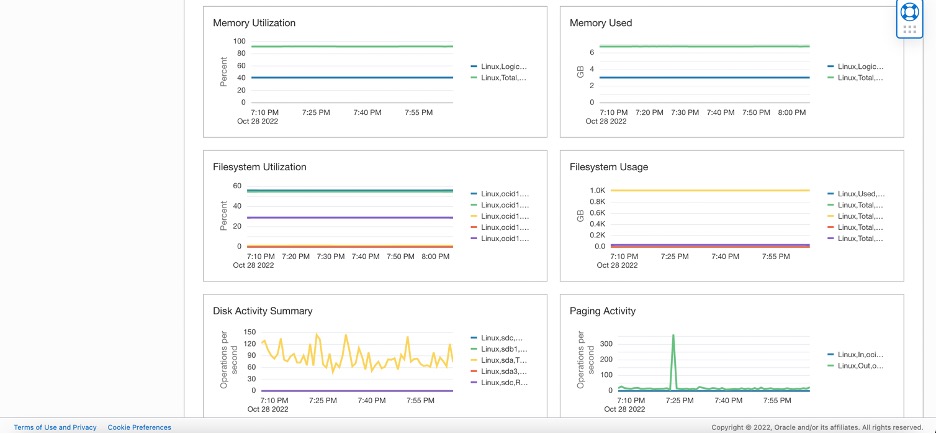
-
You can choose the Filesystem Used (GBs) and Filesystem Utilization(%) to get more specific information about the storage present in the host. The table view provides all the metrics in a table style/format.
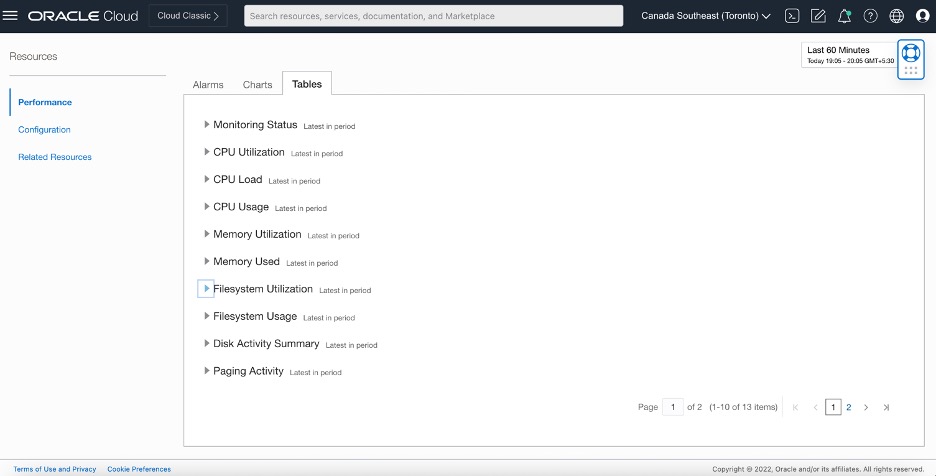
-
Once you select the specific information of instances, it will be displayed in both percentage and storage in GB. Each of the filesystem presented in the host machine will be represented with the mount points in table format.
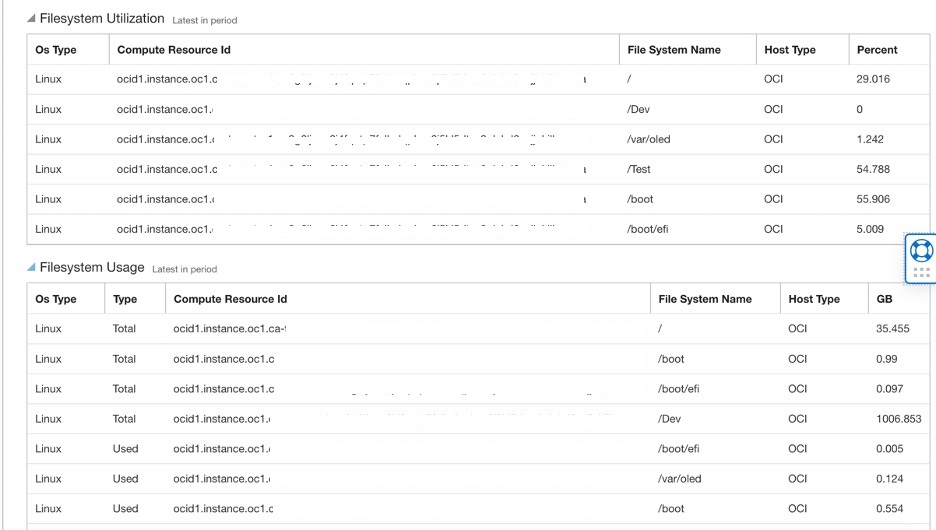
-
-
Related Links
- Manage VM disk utilization using Stack Monitoring
- Host Observability with Stack Monitoring
- OCI Stack Monitoring
Acknowledgments
- Authors - Maninder Flora (Cloud Architect), Akarsha I K (Cloud Architect)
More Learning Resources
Explore other labs on docs.oracle.com/learn or access more free learning content on the Oracle Learning YouTube channel. Additionally, visit education.oracle.com/learning-explorer to become an Oracle Learning Explorer.
For product documentation, visit Oracle Help Center.
Automate OCI Stack Monitoring deployment for OCI Compute Instances
F76829-01
January 2023
Copyright © 2023, Oracle and/or its affiliates.